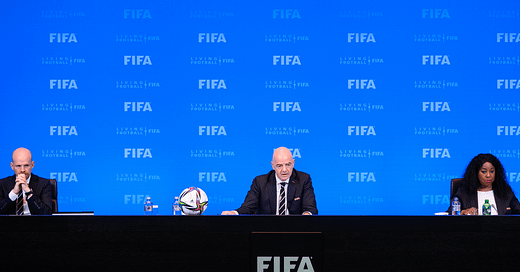🥅 In defense of scarcity
A majority of Concacaf countries favor a World Cup every two years, but...
Welcome to Getting CONCACAFed! Premium subscribers recently got the low-down on crowd trouble in the region plus Honduras’ new manager. If you’re not yet a premium subscriber you currently can go premium for $50/year, which is less than $1 a newsletter! Subscribe below:
Something is happening with the frequency of the World Cup. Beloved figures like Arsene Wenger and Jill Ellis are championing the idea of taking something we’re used to enjoying every four years and making it happen every two years.
What exactly is happening is not entirely clear. Reports in Spain yesterday said FIFA communicated to national teams that it planned to go forward with the every two year plan.



Yet today, FIFA President Gianni Infantino called for a summit in two months to discuss the plan with federations after many voices in the sport have pushed back, citing player fatigue, regional interests, traditionalism and more.
“The discussions around our World Cups have provoked some strong reactions,” Infantino said after a FIFA Council meeting. “I have heard some critical comments I have heard many enthusiastic comments as well. The discussion is very different in different parts of the world. My objective is to try to bring everyone together, and we must come together.”
So what is the discussion like in our part of the world?
Concacaf has remained pretty quiet on the issue, putting out a statement in September that said the confederation has an open mind about changes to the international calendar and emphasizing that a calendar should not favor any region of the world over another. Otherwise, leaders have been content to let FAs talk it out and stay behind the scenes.
The leaders of individual FAs in Concacaf largely would be on board, especially in the Caribbean, where populations generally are small and teams typically not able to qualify for the World Cup in the current format.
Of course, the Caribbean bloc carries with it more than 20 differnet countries and 20 votes.
“In our region, we are not playing competitive football at the level of World Cup qualifying and trying to make it to the Finals,” Caribbean Football Union President Randy Harris told the Jamaica Gleaner last month.
“We in the Caribbean would support a World Cup every two years. World Cup would bring an appeal to the players, officials and the general public that nothing else does.”
It’s true Caribbean countries do need to play more matches more often. That is why the Nations League was put into place.
The first running of the tournament showed us some of the gaps that still exist, but it also showed us that with more matches and a more serious approach that gap can change. A country like Suriname or Grenada, which earned promotion to League A and a spot in the Gold Cup, can find belief in pushing on and potentially making the World Cup one day - especially as the field expands to 48 teams from 2026.
The most exciting thing about international soccer for me is not the World Cup, though I love it like every fan of the game loves it (and covering the 2018 tournament in Russia is a career highlight). The most exciting thing is World Cup qualification. Every single team can field a squad and play in front of their home crowd. One country, united behind the same group of people, hoping for the same goal.
The final round of World Cup qualification in the Concacaf region has been fantastic to this point, especially as fans once again are able to fill stadiums safely.
Mexican federation president Yon de Luisa suggested to the Press Association last month that the Gold Cup, our continental championship, could serve as qualification. Yet, that would deprive fans of local games, making Nations League the only official matches in which fans can see their team play in their country.
Even though De Luisa seemed on board in September, the FMF president wasn’t convinced going to a World Cup every two years would be as much of a windfall as those behind the plan would like FAs to believe.
“The money that gets into the industry is finite, it cannot increase,” De Luisa said. “(But) there can be a pretty good upside. If we get a second World Cup (in a four-year cycle) I’m sure it’s not going to be twice as much (revenue), but if it’s 50 percent of the previous or the regular income then that can make a big difference that all the federations get around the world.”
If this plan were truly about growing the game, about boosting development in under-served regions and increasing the number of young people playing soccer because of an uptick in interest in some of the world’s smallest countries, it would be laudable.
But it’s not.
We know it’s not. FIFA could be working to boost interest in Anguilla or the Bahamas or Chad or Moldova right now. In some ways, it already is with its current disbursements, development programs and oversight.
This plan for more World Cups is to make more money, to extract every possible dollar out of fans and the corporations who know those fans will watch their country’s national team through the thick and the thing - especially at the sport’s showcase event.
Those behind this push are forgetting a key lesson.
Scarcity makes things valuable.
Infantino has compared more World Cup Finals to the Super Bowl, an annual event. Yet, part of what makes the World Cup so much more transcendent than the Super Bowl is knowing it long will echo, unlike a domestic league season in which the champion has only months to enjoy before putting its title back on the line.
We see in the Concacaf region that having the Gold Cup every two years, while lucrative for teams, is too much for fans. Supporters in the know reference ‘off year’ and ‘on year’ Gold Cups.
Rather than looking to cram more World Cup Finals into a short period of time and squeeze the tournament dry of all cash, the global governing body would be better served finding a way to make the 133 countries who never have made the World Cup in its current format competitive, assuring the resources intended for facilities, youth programs and equipment gets where it’s supposed to go rather than ending up in someone’s suit pocket. Countries from Concacaf and Asia should be able to compete with those in Europe and South America. FIFA programs should help them achieve that.
“We’ve always done it this way,” is a never a reason to keep doing things in the same fashion. This isn’t a traditionalist argument, though I certainly have plenty of romanticism about this tournament we’ve held every four years since 1930 (and every four years since 1991 for the women’s game). This is instead an appeal to recognize that in this case less is more, keeping the global competition special while giving a chance to spotlight regional competitions and matches taking place locally.
The ‘sporting side’ of the argument can only lose out to the ‘business side’ so many times before fans get fed up and take those dollars that fuel the whole machine somewhere else.









Agreed. What do you think of the concept of having a secondary tournament for the countries that don't quite qualify for the WC? Like the Euros but for national teams world wide. That would give more meaningful games to countries on the cusp around the world and improve visibility into them too
(Fully got this idea from TSS but I love it)
I couldn't agree more with your statement that the best part of the World Cup isn't the WC Finals, but the qualification path. If there are as many chances for "big games" that mean something between the two teams competing to move up the ladder to qualification, the game will grow. World Cups every two years will ultimately end up with big countries sending "B teams" and treating it as a youth tournament, which will dilute the meaning for the eventual winners.